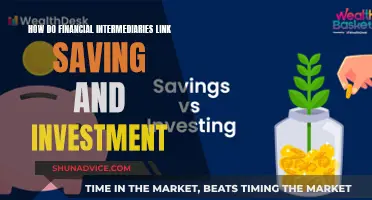
There are many factors to consider when deciding whether to sell investments to buy a house. Firstly, it's important to understand the tax implications of selling investments, as capital gains tax will likely need to be paid on any profits made. It's also crucial to assess your financial goals and risk tolerance. Selling investments to buy a house may be a good idea if you need the money soon, if you want to adjust your portfolio, or if you've found a house you really want and can afford it. However, it's generally not advisable to sell stocks just because their price has increased or decreased, or solely to save money on taxes.
| Characteristics | Values |
|---|---|
| Reason for selling investments | To buy a house |
| Tax implications | Yes, you will likely have to pay capital gains taxes on the sale of your stock. The amount of taxes you owe will depend on the cost basis of the stock, how long you held it, and your income tax bracket. |
| Alternative financing options | Down payment assistance programs, gift funds, low down payment mortgages |
| Time to sell | Once you've assessed your tax liabilities, signed a purchase contract, and gotten your financing approved |
| Consult | A mortgage lender and a tax or accounting professional |
What You'll Learn

Understand the tax implications
Selling stocks to buy a house creates a taxable event, so it's important to understand the tax implications before you sell. The amount of tax you'll pay will depend on several factors, including the cost basis of the stock, how long you've held it, and your income tax bracket.
Capital gains tax
If you sell stocks for a profit, your earnings are known as capital gains and are subject to capital gains tax. Capital gains tax rates are typically lower than rates for ordinary income. In the US, the IRS taxes capital gains at three rates: 0%, 15%, and 20%. How much you pay will depend on how long you owned the stock, your tax status, and your taxable income.
There are two types of capital gains tax: long-term and short-term. Long-term capital gains tax applies to profits from the sale of stocks held for over a year, while short-term capital gains tax applies to profits from the sale of stocks held for a year or less. The short-term tax rate is the same as your regular income tax rate, which is typically higher than the long-term capital gains tax rate.
Tax-loss harvesting
You can reduce your capital gains tax by selling low-performing stocks through a strategy called tax-loss harvesting. This involves selling investments that have lost value to offset your taxable capital gains. If your capital losses exceed your capital gains, you can write off up to $3,000 per year to reduce your income tax. Any losses above this amount can be carried over to the next year.
Tax implications of different stocks
Not all stocks carry the same tax ramifications. The IRS taxes long-term capital gains (investments held for more than a year) at a much lower rate than ordinary income. If your marginal tax rate is 15% or lower, long-term capital gains are not taxed at all. Short-term capital gains, on the other hand, are taxed at the same rate as your marginal tax bracket. For example, if you're in the 28% tax bracket and sell a stock you've held for less than a year for a $5,000 profit, you'll pay $1,400 in capital gains tax. But if you hold the stock for more than a year, you'll only pay $750.
Tax implications of mutual funds
If you're considering taking money out of a mutual fund to buy a house, keep in mind that you'll likely have to pay tax on the withdrawal. Also, check with your financial institution about any fees associated with withdrawing from your fund. Some institutions charge fees for withdrawing within a certain time frame or if your funds fall below a certain threshold.
Gladstone Investment: A Solid Buy for Income Investors?
You may want to see also

Consult with a mortgage lender
Consulting with a mortgage lender before selling investments to buy a house is a good idea for several reasons. Firstly, you need to understand your current financial picture and how much you can afford to spend on a new home. This involves determining your loan payoff amount, which is the total amount you'll need to pay to satisfy the mortgage loan terms, including any interest owed. Lenders must provide this information to you, so don't hesitate to ask. This will help you make an informed decision about selling your investments.
Secondly, be aware of any prepayment penalty fees on your current mortgage. Some lenders charge fees if you pay off your mortgage earlier than expected, usually within the first few years. These fees are meant to compensate lenders for the interest income they would have earned over the full term of the loan. Make sure to review the terms of your loan to see if these fees apply to you.
Thirdly, consider obtaining a line of credit, such as a home equity line of credit (HELOC), to fund any necessary repairs or upgrades to your current home before selling. This can be a cost-effective way to increase the value of your home and make it more attractive to potential buyers. However, ensure you can repay the loan within the required timeframe, usually 20 years, as all debts must be satisfied upon selling for a clear title.
Finally, getting pre-approved for your next loan will give you peace of mind and ensure you're in a strong financial position to buy another home after selling your current one. The pre-approval process involves providing financial information such as tax returns and W2s to the lender, who will then determine your eligibility for a new loan. This step will help you avoid any surprises or financial roadblocks when you're ready to make an offer on your next home.
Uncovering Lost Retirement Investments: A Comprehensive Guide to Locating Your Funds
You may want to see also

Explore alternative financing options
If you don't want to sell your investments to buy a house, there are alternative financing options you can explore. Here are some options to consider:
- Down payment assistance programs: These are government or non-profit initiatives that help homebuyers with their down payment or closing costs. Each program has different requirements, but they can be a great option for first-time homebuyers or those who meet certain income thresholds.
- Gift funds: If you have a family member or close friend who is willing to help, you can receive gift funds to cover your down payment or closing costs. Gift funds under a certain amount are typically not taxed, so this can be a tax-efficient way to boost your home-buying budget.
- Low down payment mortgages: There are several mortgage programs that require a low or no down payment, such as FHA loans, VA loans, or conforming loans. However, these loans usually come with additional costs like private mortgage insurance (PMI), resulting in higher monthly payments.
- Rent-to-own agreements: With this option, you rent the property with the option to purchase it later. You may be able to build equity through rent payments, and some programs are overseen by nonprofits or government housing agencies. However, rent-to-own agreements can be complex and may come with higher purchase prices or strict requirements.
- Seller financing: In this arrangement, the seller acts as the lender and finances the purchase of the home. This can be an option if you can't get approved for a traditional mortgage, but it may come with higher interest rates and shorter repayment periods.
- Paying in cash: If you have the financial means, paying for a house in cash can be a great option. It simplifies the buying process, eliminates the need for a mortgage, and may even be preferred by sellers in a competitive market. However, tying up a large amount of cash in a single asset can be a significant drawback.
- Security-based line of credit (SBLOC): If you have a substantial investment portfolio, you can take out a loan against your securities. This allows you to access cash without selling your stocks and potentially missing out on future gains. However, if the value of your stocks decreases, you'll still be responsible for repaying the loan.
The Long Road to Recovery: Navigating the Uncertain Timeline of Market Rebounds
You may want to see also

Sell immediately once you've decided on a house
Once you've assessed your tax liabilities, signed a purchase contract, and gotten your financing approved, don't delay in selling the stock you need. Things change fast in the stock market, and it's an awful feeling to set aside a few thousand shares to cover your down payment only to see those shares lose 5% of their value before you liquidate.
The stock market fluctuates, sometimes in a matter of hours. If you take too long, your shares might sink before you cash out. Therefore, once you've signed the contract, sell your stock to guarantee you have the agreed-upon down payment ready.
If you're not a very conscientious, attentive trader, you don't know what will happen to your stock in the time between signing the contract and your closing date. All it takes is one bad quarterly report to tank a portion of your down payment.
Understand the tax implications
You can technically sell any stock to get your down payment, but not all stocks carry the same tax ramifications. The IRS taxes capital gains in two ways: long-term capital gains and short-term capital gains.
Investments held for more than a year are long-term capital gains and are taxed at a much lower rate than ordinary income. (Note: They are not taxed at all if your marginal tax rate is 15% or lower.)
Short-term capital gains are taxed at the same rate as your marginal tax bracket. If you're in the 28% tax bracket and sell a stock you've held for less than a year for a $5,000 profit, you're subject to $1,400 in capital gains tax. Hold it for more than a year, and it would be only $750. That's a huge difference and an important point to consider when selling off stock for a down payment. Long-term holdings are usually preferable, even if short-term ones have profited more.
Be selective about what you sell
Avoiding brutal capital gains taxes is important, but that doesn't mean you should only sell long-term holdings. Consider why you purchased a specific stock in the first place. Did you buy it for its long-term potential or because it was safe?
Most people construct portfolios with a balance between long-term safe stocks and bonds and short-term, riskier ones. Of course, it's different for every portfolio, but selling off those long-term, safe holdings is a good idea, not just because of the capital gains benefit. If you have shares in an established company whose stock doesn't fluctuate much, you have a great chance to sell now and buy again at the same or similar price. It's not like you're selling Apple in 2001.
While some stocks in futuristic industries like self-driving cars or green technology may be volatile and concerning right now, they still likely have more growth potential than an entrenched stock like Johnson & Johnson.
Analyze your portfolio, understand what qualifies as "long-term" and "short-term," and make an educated decision to sell off stocks you can probably buy again at a reasonable price.
Retirement Savings: Investing Not Required
You may want to see also

Be selective about what you sell
When deciding which stocks to sell to raise funds for a house purchase, it's important to be selective. Here are some key considerations:
Long-term vs. Short-term Holdings
The IRS taxes capital gains in two ways: long-term and short-term capital gains. Long-term capital gains are taxed at a much lower rate than ordinary income, and in some cases, they aren't taxed at all. On the other hand, short-term capital gains (for stocks held for less than a year) are taxed at the same rate as your marginal tax bracket, resulting in a higher tax bill. Therefore, it's generally advisable to sell long-term holdings first to take advantage of the lower tax rates. However, this should be balanced with other factors, such as the potential for future growth.
Reasons for Buying the Stock
Consider why you purchased specific stocks in the first place. Did you buy them for their long-term growth potential, or because they offered safety and income? Stocks purchased for safety and income, such as established companies with stable stock prices, are often good candidates for selling. These stocks tend to have less price fluctuation, so you may be able to buy them back at a similar price in the future. In contrast, stocks with high growth potential, such as those in futuristic industries, may be more volatile but still have significant room for growth.
Tax Implications
When deciding which stocks to sell, consider the tax implications to optimise your tax outcome. If you have losing positions, you can use investment losses to offset your capital gains and reduce your taxable income. Additionally, if you didn't have any gains for the year, you can use up to a certain amount of investment losses to further reduce your taxable income. Any losses above this amount can be carried over to the next year, potentially boosting your tax refund.
Portfolio Balance
Most investment portfolios are constructed with a balance between long-term safe stocks and short-term, riskier ones. When deciding what to sell, consider the overall balance of your portfolio. Selling off long-term, safe holdings can help maintain this balance while also taking advantage of the capital gains tax benefit.
Stock Performance and Future Potential
Analyse the performance of the stocks in your portfolio and their future potential. If certain stocks have already experienced significant growth and you believe they are overvalued, it may be a good time to sell and take profits. On the other hand, if you feel that certain stocks are undervalued and have further growth potential, you may want to hold onto them.
San Bernardino's Investment Future: When Will Private Sectors Step In?
You may want to see also
Frequently asked questions
Yes, in many cases, selling stock for a down payment on a house is a smart move. Generally speaking, the only investment that performs better than the stock market is real estate. But remember that the IRS taxes capital gains, including stock sales. Determining whether selling stocks to buy a house makes sense for you will depend on how big your tax bill is.
Typically, you'll have to pay tax on capital gains if you sell stock to buy a house. The amount you pay (if any) depends on a number of factors. For example, holding stocks for more than a year will lower your tax bill. On the other hand, if you’ve held the stocks for under a year, you’ll most likely have to pay short-term capital gains, which are higher. But if you’ve lost money on your stocks, you can write off the investment losses, which will lower your tax bill. Another factor is your marginal tax bracket. If it's less than 15%, you may not have to pay tax on your stock sales.
Yes, you can take money out of your mutual fund to buy a house. But just like with the sale of other stocks, you’ll likely have to pay tax on the withdrawal. Also, check with your financial institution first about any fees you’ll face for withdrawing. Some institutions, for example, charge fees if you withdraw from your fund less than a year after purchase, while others charge a maintenance fee if your funds fall below a certain threshold.
Here are some reasons to sell a stock:
- Your investment thesis has changed. For example, the company's market share is falling, sales growth has slowed, or the company's management has changed and is making reckless decisions.
- The company is being acquired. After an acquisition is announced, the stock price of the company being acquired typically rises to a level close to the agreed-upon purchase price. Since further upside potential can be quite limited, it may be wise to lock in your gains shortly after the acquisition announcement.
- You need the money or soon will. It's generally a best practice not to invest in the stock market with any money you expect to need within the next few years.
- You need to rebalance your portfolio. Your investment portfolio can become unbalanced, and periodically rebalancing your portfolio -- which may involve selling some stock -- is necessary for most investors.
- You identify opportunities to better invest your money elsewhere. In a perfect world, you'd always have spare cash to invest for every time you identify an attractive investment opportunity.
Any of the above are good reasons to sell a stock for a profit. Having earned a profit from an investment can further justify selling the stock to pay for a major purchase, your living expenses in retirement, or as part of your portfolio allocation strategy. But don't sell a stock for profit just because the price increased.







